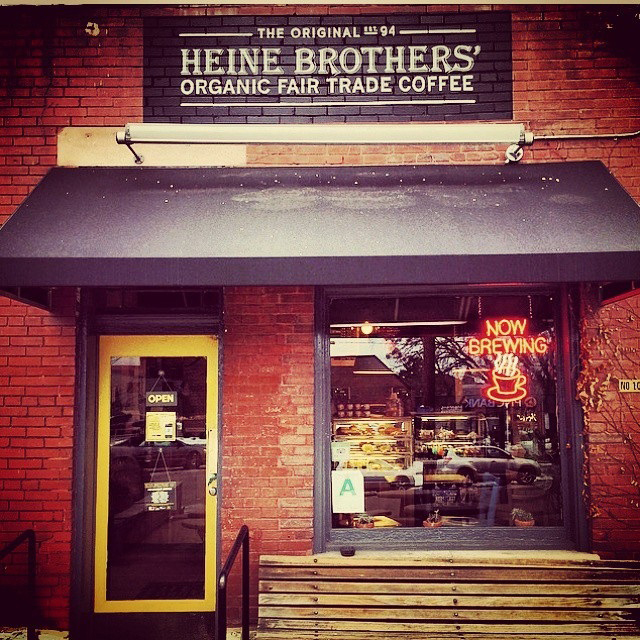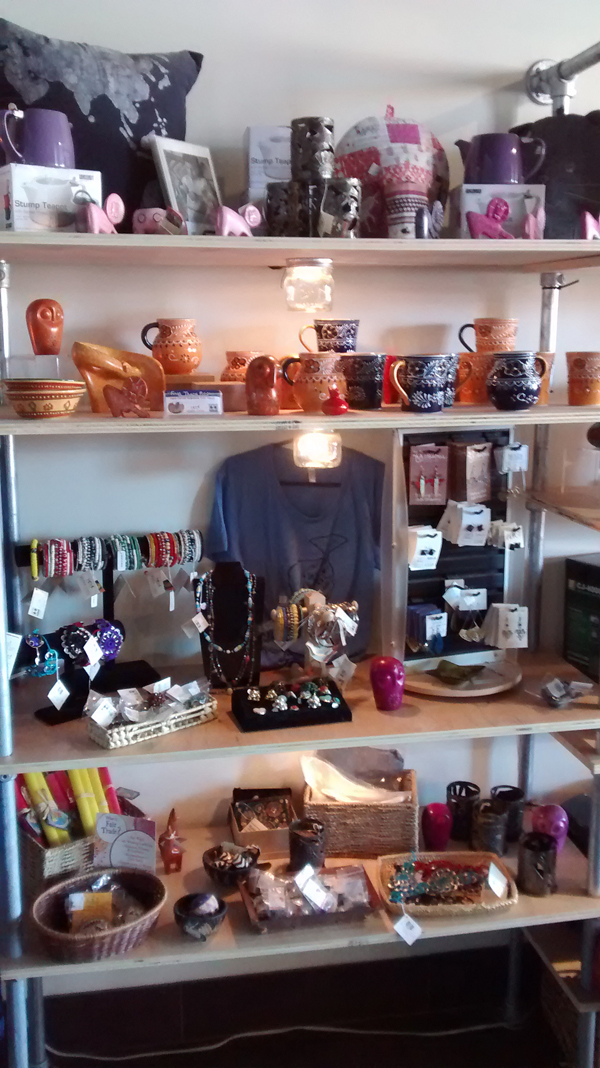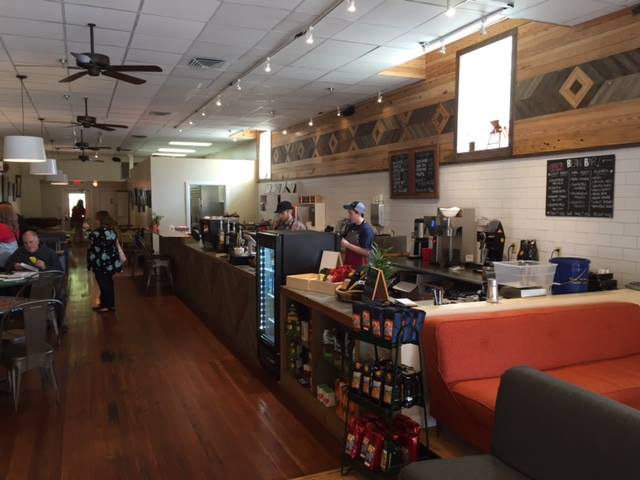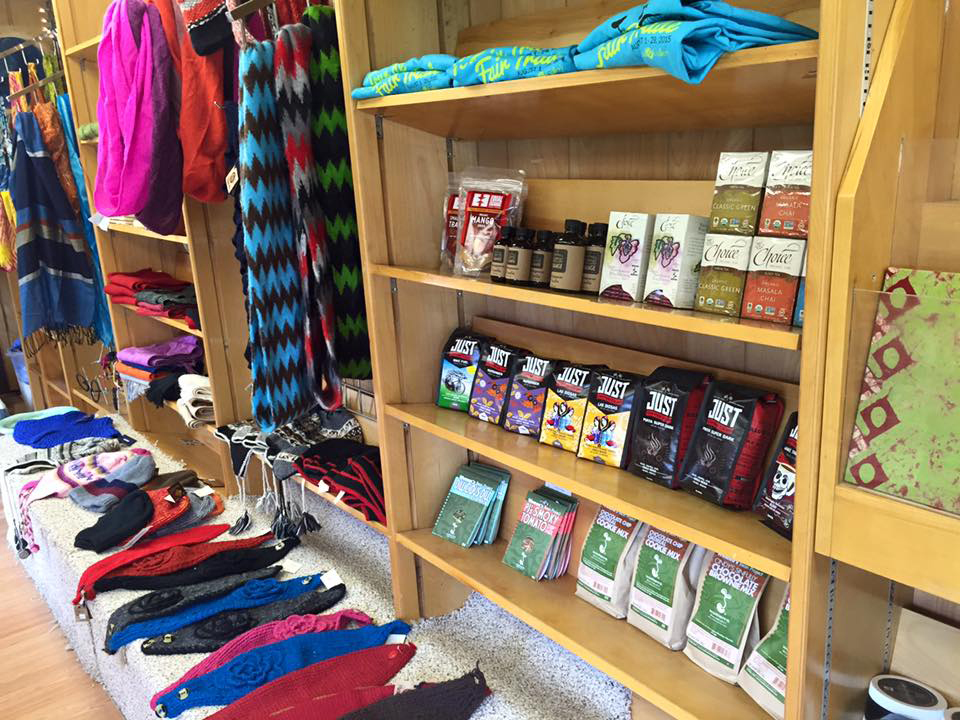Your retail location has been up and running for a while. Sales have been consistent the last few years and you’re pretty happy. But there’s this little voice inside of you that says, “There are a lot of fair trade artisans and farmers out there that need you to sell more, so you can buy more, so they can sell more.” The voice doesn’t nag, it doesn’t plead but you know that if you were able to grow your business, you’d be able to expand the opportunities for marginalized communities through fair trade.
Our retail store Gifts With Humanity has been open for five years. It is a whopping 500 sq. ft. and is stuffed with fair trade products. The last few years the store has performed well, so well that over a few beers, my husband and I often think about how we can grow the retail business. We’ve introduced new fair trade lines, built a dressing room (much to the chagrin of our clothing store neighbor), covered extra doors with more slat wall, added displays that hang from the ceiling. We’ve squeezed as much space as physically possible out of our little blink-and-you’ll-miss-it store. The little voice ignores the fact that we have a 5-year lease and insists that we have an obligation to grow the retail business. We’re in a tourist town. Many people eat and drink out so the idea of opening a venue that is a destination and still sells fair trade handicrafts has often crossed our slurred lips.
Tip #1 in the Entrepreneur.com article “10 Ways to Grow Your Business” that the way to grow that comes to mind first is often Open another location. It also suggests that this might not be the best choice and small-business speaker Frances McGuckin says, that “Physical expansion requires careful research, planning and number-planning.” My thought is if you’re in a position to open another location, you may want to consider combining it with Tip #5 on the list Diversify.
“Diversifying is an excellent growth strategy, as it allows you to have multiple streams of income that can often fill seasonal voids and, of course, increase sales and profit margins,” says McGuckin. In a small town like where we live, it would be difficult to open another fair trade gift store and if we did, it would be subject to the same dead months as the first store. But what about a fair trade coffee shop that sells fair trade handicrafts?
 I did a little research by reaching out to some of my favorite coffee places that sell fair trade handicrafts. I asked some of those businessy questions that would make Frances McGuckin proud. Heine Brothers Coffee, one of the cofounders of Cooperative Coffees, has 13 neighborhood-focused retail locations in the Louisville, Kentucky area, trickling into Indiana. Chuck Slaughter, Heine Bros.’ marketing guy, says “We sell fair trade jewelry/crafts/wearables in almost all of them, but they definitely sell better in the neighborhood shops with lots of foot traffic, less in the downtown shops or the suburban shops. All of our fair trade items are in specific locations in our retail area, and take up anywhere from 10-20% of the total retail merchandise space (not counting our fair trade coffee & tea, which takes up another 30% of our retail merchandise space). We purposely have low margins on our fair trade retail items, not because they don’t sell well, but because the more than we sell, the more that we can purchase from these fair trade groups.”
I did a little research by reaching out to some of my favorite coffee places that sell fair trade handicrafts. I asked some of those businessy questions that would make Frances McGuckin proud. Heine Brothers Coffee, one of the cofounders of Cooperative Coffees, has 13 neighborhood-focused retail locations in the Louisville, Kentucky area, trickling into Indiana. Chuck Slaughter, Heine Bros.’ marketing guy, says “We sell fair trade jewelry/crafts/wearables in almost all of them, but they definitely sell better in the neighborhood shops with lots of foot traffic, less in the downtown shops or the suburban shops. All of our fair trade items are in specific locations in our retail area, and take up anywhere from 10-20% of the total retail merchandise space (not counting our fair trade coffee & tea, which takes up another 30% of our retail merchandise space). We purposely have low margins on our fair trade retail items, not because they don’t sell well, but because the more than we sell, the more that we can purchase from these fair trade groups.”
 Equator Coffee Roasters in Canada, with two café locations that sell fair trade handicrafts, echoes Heine Bros.’ business model. “The retail portion of our cafe is mostly dedicated to our coffee that we roast on site,” write Amy Graat. “Our mission is to increase sales and awareness of our fair trade organic coffee in order to benefit the farmers we work with and to be able to continue to grow with them and achieve their goals for production and distribution. We feel that offering fair trade crafts is an extension of this mission. The sales from the craft section are not huge but it is important to us to be able to ‘open doors’ to help craftspeople get a chance to break into our North American market. I find it means more to our customers when they know the back story of the craftspeople. So more signage and real-life stories would likely help raise awareness and sales.”
Equator Coffee Roasters in Canada, with two café locations that sell fair trade handicrafts, echoes Heine Bros.’ business model. “The retail portion of our cafe is mostly dedicated to our coffee that we roast on site,” write Amy Graat. “Our mission is to increase sales and awareness of our fair trade organic coffee in order to benefit the farmers we work with and to be able to continue to grow with them and achieve their goals for production and distribution. We feel that offering fair trade crafts is an extension of this mission. The sales from the craft section are not huge but it is important to us to be able to ‘open doors’ to help craftspeople get a chance to break into our North American market. I find it means more to our customers when they know the back story of the craftspeople. So more signage and real-life stories would likely help raise awareness and sales.”
I asked Bill Harris of Café Campesino for a few hints on opening a fair trade coffee shop. Café Campesino recently opened in a new location in Americus, GA. “It’s all about location and traffic patterns,” Bill said, “There are destination coffee shops in remote locations that are successful, but they have to have an established system for reaching customers and enticing them to visit.” He suggested a test of viability used by the coffee industry is getting 1% of the drive-by traffic and 3% of foot traffic through the door. “Eight thousand cars a day drive by our shop in Americus and only 200 people walk by,” he said. “So our success is dependent upon our getting those cars to stop at the shop. Based on these percentages, 86 visitors will likely come through the door. Since we need at least 125 customers a day to make it, the shop needs to become a destination rather than rely solely on spontaneous drive by or walk in traffic. Carrying fair trade crafts gives people another reason to come in the door and an alternative product line for us to market to  existing coffee customers.”
existing coffee customers.”
He also stressed that staff training on making the specialty coffee drinks is critical in the success. “If you’re only serving brewed coffee, staff training is relatively easy – but if you add an Expresso Bar serving lattes and cappuccinos, a lot of training is required to ensure that no matter who makes the drinks, they taste great and are consistent.”
Investing in equipment is another consideration. Bill suggested that equipment costs for a low-volume setup (less than 100 cups a day) should be $15-20,000 with high-volume equipment costs between $20-30,000. “While there’s a lot of used equipment out available on the internet,” Bill said, “avoid the stress of unreliability and invest in new equipment unless the used equipment vendor is local and provides a warranty.”
Over the years I’ve watched Dr. Connie De Jong promote fair trade through several retail venues in the Columbus, Ohio area. While she currently operates the fair trade wholesale organization World Peaces, she migrated the retail store Global Gallery to a coffee shop, a venture I found fascinating, given my current bar conversations. When I asked what motivated her to open a fair trade coffee shop, she said, “Most people learn of fair trade from coffee and drinking coffee in a coffee shop creates an environment for conversation and social interaction versus a retail store where the goal is to make sales.”
Because the Global Gallery Coffee Shop is not an extension of a fair trade coffee roaster, it carries coffee from multiple fair trade coffee roasters. Selling Grounds for Change coffee in the Global Gallery retail stores helped develop excitement around coffee.
 The explanation as to why Global Gallery dedicates more floor space to fair trade handicrafts and local crafts than the more traditional fair trade roaster coffee shops is not only the result of Connie’s long standing involvement in fair trade retail stores. While she no longer operates the coffee shop, she acts as curator for the fair trade handicrafts that are sold there, offering World Peaces products on consignment and arranging and rotating the stock as well as educating the staff on the products and artisans.
The explanation as to why Global Gallery dedicates more floor space to fair trade handicrafts and local crafts than the more traditional fair trade roaster coffee shops is not only the result of Connie’s long standing involvement in fair trade retail stores. While she no longer operates the coffee shop, she acts as curator for the fair trade handicrafts that are sold there, offering World Peaces products on consignment and arranging and rotating the stock as well as educating the staff on the products and artisans.
One of the challenges that Global Gallery coffee shop is still working on is making sure that everything aligns with Fair Trade principles. “When we offered coffee ‘to-go’ we didn’t have a solution for disposable cups, ” Connie said. She marveled over Higher Grounds Trading Company in Travis City Michigan, who, for those who can’t stay for a while, give the to-go orders in donated ceramic cups.
As a fair trade wholesaler, we sell fair trade handicrafts to many fair trade coffee shops. Their passion for coffee is tireless and they would love to see more fair trade functional products that relate to coffee and tea, products they understand. I’m certainly no coffee expert (I’m actually a tea drinker…) and would definitely want the expertise of the coffee roaster in diversifying into a second location coffee shop, which I know they would be more than willing to provide. That location thing is a big issue here in a small town, however. You’re right Frances McGuffin, opening a second location may be a little daunting for a lot of reasons. But after the conversations, I started thinking of skipping directly to Tip #5 and just Diversify. Getting a fair trade corner in like-minded businesses would increase fair trade sales in my town. And now I finally read Tip #4, Form an alliance. “Aligning yourself with a similar type of business can be a powerful way to expand quickly.” it says.

Good job, Renice–does this mean you’ll be selling crafts in a coffee shop as well?
Probably not in the near future – but who knows moving forward. We would love to partner with more existing coffee shops to offer the gift items.